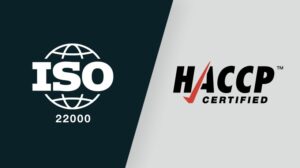
A supply chain with diverse production processes to deliver products to customers’ doorsteps needs proper quality maintenance. The manufacturing, sourcing, Comprehensive Logistics Solutions, and distribution procedures might deteriorate the overall quality of the product, thus affecting customers.
Achieving quality goals requires certifications like HACCP and ISO. HACCP (Hazard Analysis And Critical Control Points) and ISO (International Organisation For Standardisation Standardisation) play vital roles in maintaining the high standards of businesses that promise quality to their customers.
It becomes quite easy for businesses to maintain quality and standards by hiring companies that offer HACCP Certification Services, minimizing risks, and ensuring high food safety. Like HACCP, ISO standards are also highly important in improving environmental safety. Partner with experts who offer ISO Certification Consultancy services to streamline your business quality assurance processes.
What Is HACCP Certification?
Businesses that learn the gaps and potential hazards that ultimately affect their entire process are considered fortunate. The HACCP Certification system is used across various sectors to streamline the quality of the food process. This certification focuses on identifying the potential hazards of products and steps taken to control those hazards.
How Does This Certification Work?
Industries like food and beverage are critical because the health of consumers is involved, so the process of HACCP certification is crucial.
Identification Of Hazardous Material
The first step of the process involves identifying any harmful or hazardous material, such as viruses, bacteria, chemical agents like pesticides, or physical hazards like broken glass or metal, that can be dangerous for the consumer.
Critical Control Points (CCPs)
This is the most vital process of maintaining the overall quality of products. For instance, if a hazardous material has been found in any product, like a harmful bacteria, then the stages of CCPs begin in the production process. These are the processes where the risks are controlled and reduced.
A bacteria found in food is killed by heating it to a temperature that kills that bacteria; for example, a temperature of 75C is set. The business will now stay within those limits once the critical control point is set. These limits are monitored regularly to ensure that safety standards are upheld.
Regular Monitoring
The last step of HACCP regulation is regular monitoring. Businesses need to be monitored regularly to ensure work efficiency. They are also advised to maintain a detailed record of safety checks, which serves as proof for regulatory authorities to be reviewed.
Internationally Recognised ISO Standards
There are common ISO standards that cover various aspects, such as quality management or environmental performance, to improve a business’s overall quality. Some of the common ISO standards are.
ISO 9001: Ensure quality management meets customer quality standards.
ISO 14001: Helps businesses reduce their carbon footprint.
ISO 45001: Ensure a safe environment for employees by addressing and reducing workplace risks.
ISO 22000: Implements food safety principles, including HACCP for food supply chain quality.
Complementing Of HACCP And ISO Work
HACCP and ISO work together to ensure the overall quality of industries like food production and manufacturing in a better way. HACCP works to activate the guidelines to prevent specific hazards like chemicals or bacteria, and ISO provides a broader framework to meet customer satisfaction. If HACCP ensures that there are proper regulatory systems of food quality then ISO 22000 integrates HACCP into a more extensive food safety management system.
Conclusion
Following the rules of HACCP and ISO standards is vital for businesses to excel in modern supply chains. They ensure the safety of products and provide room to enhance a business’s quality. Businesses that don’t meet the standards of ISO or HACCP face giant losses and don’t get to work in comprehensive logistics solutions.
FAQs
What are the companies that get the most benefit from HACCP certification?
There are many companies, such as food production, pharmaceuticals, cosmetics, and even packing companies, for which HACCP certifications are widely applicable, and theft is supposed to be on quality standards.
Do small businesses need HACCP certifications?
Yes, every business, regardless of size, needs to meet quality standards for better customer trust and qualified standards.

